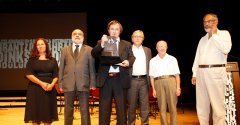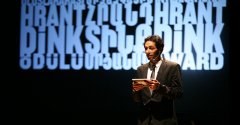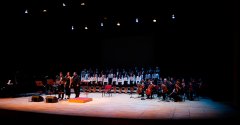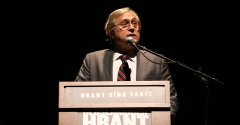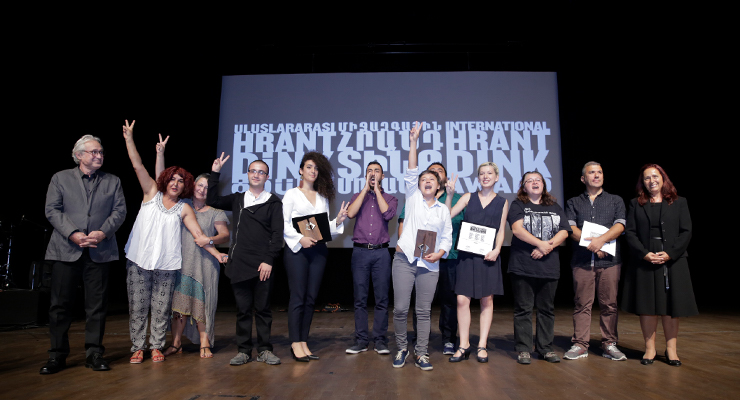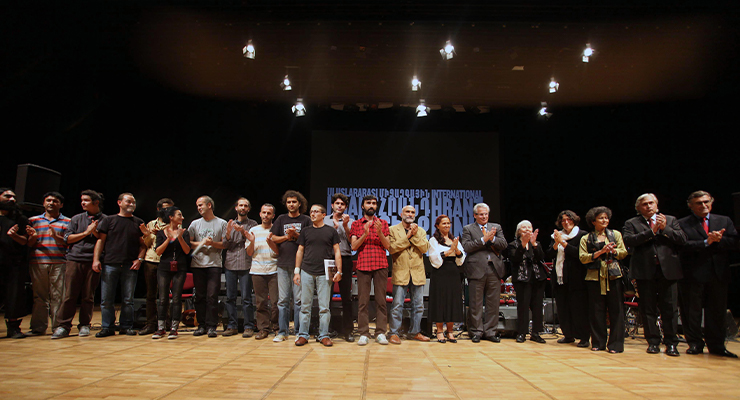2012 Ödül Töreni
https://hrantdink.org/images/odul/2012/800_418/01475_800x418.jpg
https://hrantdink.org/images/odul/2012/800_418/01488_800x418.jpg
https://hrantdink.org/images/odul/2012/800_418/01606_800x418.jpg
https://hrantdink.org/images/odul/2012/800_418/01528_800x418.jpg
https://hrantdink.org/images/odul/2012/800_418/01543_800x418.jpg
https://hrantdink.org/images/odul/2012/800_418/01336_800x418.jpg
https://hrantdink.org/images/odul/2012/800_418/01550_800x418.jpg
https://hrantdink.org/images/odul/2012/800_418/01331_800x418.jpg
The 2012 International Hrant Dink Award was presented to laureates İsmail Beşikçi from Turkey and “Memorial” from Russia, on September 15, 2012, with a ceremony organized by the Hrant Dink Foundation held at the Cemal Reşit Rey Concert Hall in Istanbul.
The award ceremony began with a song by Zuhal Olcay. The awards ceremony was hosted by Mert Fırat. In his speech, the Chair of the Award Committee Ali Bayramoğlu stated that on his 58th birthday, the name of Hrant Dink, and the awards given in his name were once again to meet with people who work for a world free of discrimination, racism, and violence, and take personal risks for their ideals. Bayramoğlu emphasized the effort of the Foundation to institutionalize the Award and added that the Laureates are determined by an international jury and a two-round system of voting, after an open nomination process. The opening remarks were followed by the premiere of the oratorio composed by Majak Toshikyan with lyrics by Bercuhi Berberyan. Four parts of the original one-hour oratorio were performed by the Surp Lusavoriç Choir, Kevork Tavityan, Aylin Ateş and Petro with Hagop Mamigonyan as maestro.
You can reach 2012 Award Booklet by clicking here.
Before the awards presentation, Inspirations, a group of people and institutions from Turkey and from all corners of the world who multiply hope for the future with the steps they take, were saluted with a film acknowledging their achievements. The Inspirations of 2012 included the resistance of villagers of Bil’in, a Palestinian village in the West Bank; the Romedia Foundation in Hungary who work for the rights of the Romani people in Romania; HOPE NOT HATE, an initiative from the UK that fights racism; PINK Armenia, an organization that works for LGBT rights in Armenia; Masa Mirkovic, director of ‘New Generation’ in Bosnia Herzegovina, an organization that supports children who are victims of violence; Triveni Acharya, an activist and journalist from Mumbai who works to prevent human trafficking; Mark Kabban, a Lebanese American immigrant, who works towards the social integration of immigrant children; Dr. Benjamin LaBrot from the United States who develops healthcare projects for remote parts of the world; James Kityo from Uganda, who develops innovative public health and shelter projects; the Initiative for Solidarity with Arrested Students in Turkey; the ‘My Body, My Decision’ campaign of Bianet, a media organization from Turkey; the solidarity organization Families of LGBT from Istanbul; the ‘Van, You Are Not Alone’ Campaign, organized in the aftermath of the Van earthquake; and The Mad Waves Outside initiative from Turkey that sends books and stationery to political prisoners
The award presentation was accompanied by films made by Ümit Kıvanç. The award statue was presented to İsmail Beşikçi from Turkey by jury members Rakel Dink and Etyen Mahçupyan. Beşikçi received the award for his tireless efforts towards a social and political solution of the Kurdish Issue, refusing to be silenced despite being subjected to threats and maltreatment throughout his life. Beşikçi has continued to carry out research, write books and by sustaining his struggle he has allowed society to confront its problems, and made real transformation possible. Beşikçi, in his speech about the term Near East, stated that the issues faced by the peoples of the Near East, “cannot simply be solved by the ‘apologies’ of government officials. Historical and social research that grasps the integrality of the Near East bears great importance. This is the only way in which historical and social awareness will develop. As this awareness develops, both people and nations, and the diverse sections within peoples or nations will strive to better understand each other; and consciously abstain from harming each other”.
Alexander Cherkasov, the chairman of the Memorial Human Rights Center received the 2012 International Human Rights Award on behalf of the International “Memorial” Society. Since the 1990s when it was established, “Memorial” has been working on confronting the past. Memorial received the award for their systematic effort to form an archive of state terrorism, and to reveal human rights violations. “Memorial” appeals to society at large to confront not only past human rights violations but also ongoing infringements. They draw attention to human rights violations that take place at zones of armed conflict and provide information to the public. They work for the rights of immigrants, refugees and asylum-seekers, and aim to transform migration services so that they protect not the interest of the state, but the rights of refugees. They proclaim that, “Our history is not the history of the state, but the history of the people, and often also a history of human rights abuses. Thus, when we work with history, we learn about human rights. And this will make it possible to reduce human rights abuses today…” Memorial stands in solidarity with those who are struggling for their ideals, and takes risk in order to defend human rights. Their outlook on history is an inspiration for everyone. The Jury of the International Hrant Dink Award 2012 consists of Ahmet Altan, Tim Garton Ash, Emma Bonino, Lydia Cacho, Rakel Dink, Costa Gavras, Nilüfer Göle, Alexander Iskandaryan and Etyen Mahçupyan. Alper Görmüş, Amira Hass, the Conscientious Objection Movement of Turkey, Baltasar Garzón, Ahmet Altan and Lydia Cacho are the former laureates of the International Hrant Dink Award.
The award ceremony was broadcast live on www.hrantdink.org and www.hrantdinkodulu.org. All the details of the ceremony were followed in 3 languages (Turkish, English and Armenian) on Facebook and Twitter on the accounts of Hrant Dink Foundation and the award.

